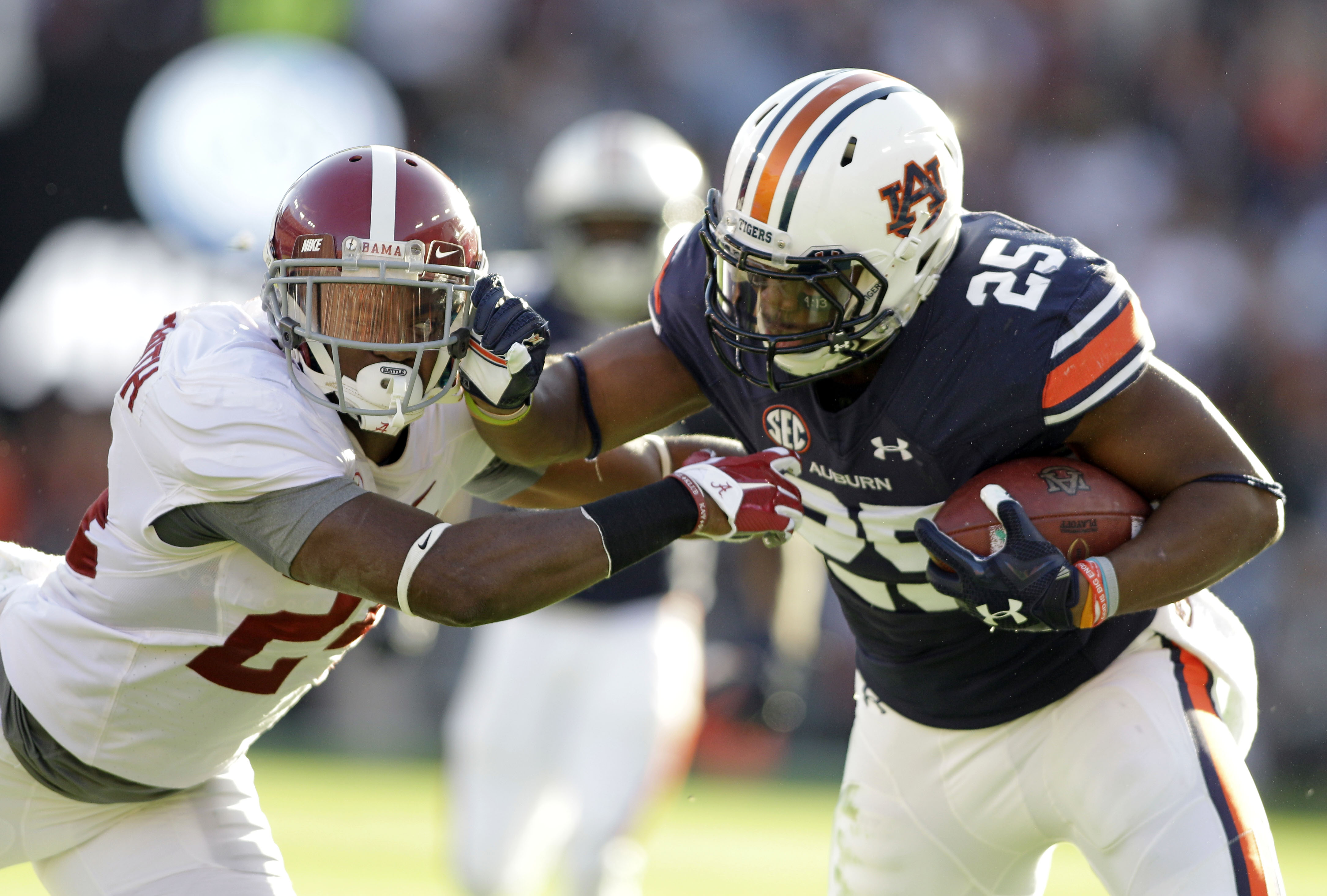
Should undrafted college football players be allowed to return?
By Chris Wright
Published:
Thirty underclassmen who entered this year’s NFL Draft were not selected. The list included several SEC players.
Most, like Auburn’s Peyton Barber, tried to catch on as undrafted free agents because … well … what other choice did they have?
Arkansas coach Bret Bielema has noticed the trend (55 players in the past two years) and thinks it’s time to allow these undrafted underclassmen the right to return to college football.
Question: Is Bielema right? Assuming they preserve their eligibility and maintain their classwork, should undrafted underclassmen be allowed to return to school and play college football?
Answer: This is a double edged sword. I’m going with no on this one. The whole NFL Combine process needs to be amended for players who declare for the NFL Draft. Players should be able to attend an underclassmen combine that would allow coaches and scouts to get a better feel for how to really project the players prior to entering the NFL Draft.
It’s one thing to watch film and project a player. It’s another to actually see him in person and see how explosive and fast he really is. So, in short, the combine process needs to be amended; however, once players fully declare, they shouldn’t be allowed to return.
— SDS co-founder Jon Cooper (@JonCooperMedia)
Answer: I initially supported Bielema’s idea. However ,after allowing the idea to marinate for a bit, I could see it causing more issues for schools and the players themselves, particularly on their path to eventual graduation.
Once prospects determine they are ready to enter the draft, preparing for the NFL’s selection process turns into a full-time job. Some leave school and miss the entire spring semester, not to mention their team’s spring football session. If the rule changed and players were allowed to make the jump to the NFL without repercussions, a number of potentially ill-advised decisions could be made by prospects not yet ready for the rigors of the NFL and a professional lifestyle.
Agents, endorsements, payments and contracts could potentially muck up matters even worse. Immediately after declaring for the draft, players sign with agents, managers among other professional representation and typically take money from these people. As they are no longer college athletes, this is completely legal and the majority of the money goes to helping the prospects get the best possible training before any pro days, combines and the draft – not to mention travel expenses and housing for those events.
Like I said, the idea in itself is great on face value, but would likely open so many new issues for schools to deal with, I don’t see it become the new standard in college athletics anytime soon.
— SDS news writer Michael Wayne Bratton (@MichaelWBratton)
Answer: My position is college football should make this happen and allow them to return to school.
However, it’s worth pointing out some of the things that will make the NCAA reluctant to change the rule. First of all, the NCAA would have to worry about what happens between the time that the players have declared for the draft and when they potentially decide to return to school. Did they hire agents and accept money from a third party? Do schools try to offer some money under the table to convince the player to return? From the coaches’ perspective, they may have some concerns because they need to know what their positions of need are so they can be filled in recruiting.
Plus, players who do decide to return to school will have missed spring practice. Still, these days graduate transfers come in the spring or summer and start in the fall. Regardless, one thing that does need to change immediately is the deadline for underclassmen to declare because forcing them to decide in mid-January for a draft in late April is ridiculous.
— SDS News Editor Talal Elmasry (@TalalElmasrySDS)
Answer: Of course they should be allowed to return to school, assuming they maintained good academic standing and preserved their eligibility.
(Basketball is a different animal in terms of scholarship impact. There’s fewer scholarships, so each one is more precious. Allowing a basketball player to test the waters and then return after the June draft would no doubt cause scholarship problems. And those scholarship problems would be handed down to the last guy on the bench.)
Football coaches have more time, more scholarships, more wiggle room. They could always hold back one or two scholarships if they thought their player was an undrafted free agent candidate.
The key, as everybody has mentioned, is rules would have to be in place that prevent the football player from receiving any payments or benefits along the way, thus preserving his eligibility. But even that is subject to eye-rolling, considering how lavishly they are treated during the award banquets, most notably the Heisman Trophy presentation.
They’re not normal students. They never have been.
As for hiring an agent, high school baseball players have worked around the “agent/advisor” rule for decades in order to gain valuable draft information while also preserving their college eligibility. That’s semantics and both sides are fine with it. That’s a simple fix.
This isn’t the 1960s or 1980s or even 2000. The dynamics have changed. Football players are leaving earlier, and more of them are leaving earlier. The issue is expanding, not going away.
Logic dictates that the math will lead to more undrafted underclassmen each year.
If the NCAA is truly interested in their well-being, they’d allow them the opportunity to return — maybe even with a more realistic view of a world without football.
There are obstacles, but there isn’t a logical reason not to.
— SDS Executive Editor Chris Wright (@FilmRoomEditor)
Managing Editor
A 30-time APSE award-winning editor with previous stints at the Miami Herald, The Indianapolis Star and News & Observer, Executive Editor Chris Wright oversees editorial operations for Saturday Down South.







